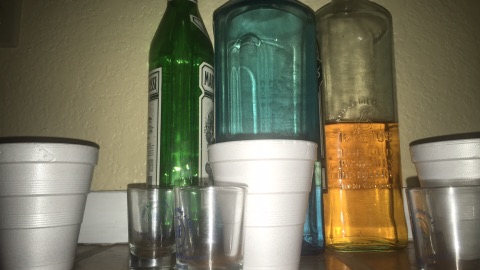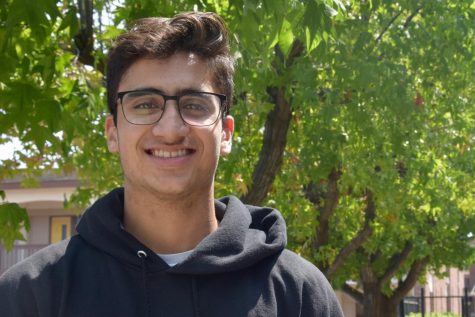The effect of teenage drinking on athletes

April 15, 2018
Everyone could smell the stench of alcohol on the MVHS soccer player’s breath as he spoke to his teammates who had gathered around him before the game. His intoxication wasn’t something he could hide easily, and it was clear to an anonymous MVHS soccer player, who will be referred to as Stan in order to protect his identity, that his teammate was drunk. Although he does still occasionally drink, seeing his teammate arrive drunk that day motivated Stan to never drink before a game.
“When you drink, you get sort of a liquid confidence and you start doing [things you] normally wouldn’t do,” Stan said.
According to Stan, everyone on the team had noticed his teammate’s intoxication but did not report it. Stan is unaware why his teammate had consumed alcohol beforehand.
Student advocate Richard Prinz believes that students and athletes could resort to drinking for various reasons. He suggests that it could be a way to escape from personal problems or from anxiety, but encourages students to find other forms of treatment for their struggles instead.
“So there’s something you’re afraid of or something that’s bothering you, or something that troubles your or gives you anxiety. Face it, look at it, talk to somebody about it. Don’t be afraid,” Prinz said.
Stan believes that his senior teammates do not drink as means for escape, but rather because they do not need to work as hard in their final year of high school.
“They still have to obviously maintain grades, but they’re not gonna grind like a junior,” Stan said.
Regardless of whether the player’s reasons for consumption were related to personal problems or just enjoyment, junior and varsity football running back Jonah Ji believes that drinking does not solve any problems, and rather only creates them. Ji also believes that students and athletes who drink do not have control over their drinking habits and they tend to drink more and more.
“In the case of underaged kids drinking, most kids that drink underaged don’t have the self control to be safe,” Ji said.
In addition to a potential lack of self control, underage drinkers also face the danger of breaking their parents’ trust and damaging that relationship.
Being a firm believer of trust, Stan expresses that it is absolutely necessary for a child to maintain trust with their parents. He thinks that being caught drinking is one way to break the trust, and can prove detrimental towards a parent-child relationship.
“I know a friend of mine who’s actually really nice kid, but his parents like found a few things in this room, and since that, they haven’t treated [him] the same. They’ve grown apart,” Stan said.
On the football team, many players like Ji have encountered various situations in which players have come to games or practices intoxicated. Ji, who does not consume alcohol believes that people are responsible for their own well-being.
“I feel like everyone on the MVHS football team is responsible enough not to get drunk before a game or in public,” Ji said.
Stan himself is careful to not get caught drinking in public or online. He knows that college coaches sometimes visit social media sites if they are looking to find more background information about their recruits, so he tries to be cautious about his surroundings when he’s drinking.
According to NCAA, 30 percent of college athletes are addicted to alcohol while another 25 percent of college athletes are accused of having a drinking problem. For this reason, college coaches are strict with their new recruits.
“One thing that I try to do if I am drinking is, try to not have any pictures taken of me or near me with alcohol or set any evidence that it was there, so my coaches cannot get a hold of it,” Stan said.
One of Stan’s former teammates had been expelled from his club team due to his drinking and smoking habits, which is another motivation for Stan to not play under the influence of alcohol.
“One of my friends […] used to smoke and drink a lot and some days he [would] show up stoned and the coach could tell and he kicked him off,” Stan said.
Ji has never personally witnessed players at MVHS getting caught or suspected of drinking although he is aware that players do drink.
“During games we have never had a problem with people being intoxicated and not being able to perform,” Ji said.
As Prinz described, the only way someone will get over their problems is by facing them and finding ways to deal with it — and drinking is not one of them. He explains that drinking can have harmful mental and physical repercussions.
“Not only can they be addictive and hurt yourself physically, but […] they can stunt your social [and] emotional growth because instead of facing the problem you go and drink,” Prinz said.
Prinz is a firm and strong believer of mental consciousness and the effect of thinking before taking action. He emphasizes that at MVHS, students are too invested in studies that they resort to drinking as they assume that consuming substances is the best way to eliminate stress and other school related problems. He stresses that the logic behind that is flawed and should not be continued.
“If you can break free of that kind of thinking, then there’s happiness right,” Prinz said “You can be happy just with your own mind. You don’t need to take substances.”
Prinz believes that before taking action, people should ask themselves why is it necessary to drink, and only then will they be able to make the decision of whether or not it is logical to continue.
“Essentially, alcohol negatively impacts most everything you do, if abused, mostly because of a lack of self control to stop drinking before the stage of complete intoxication” Ji said.
















